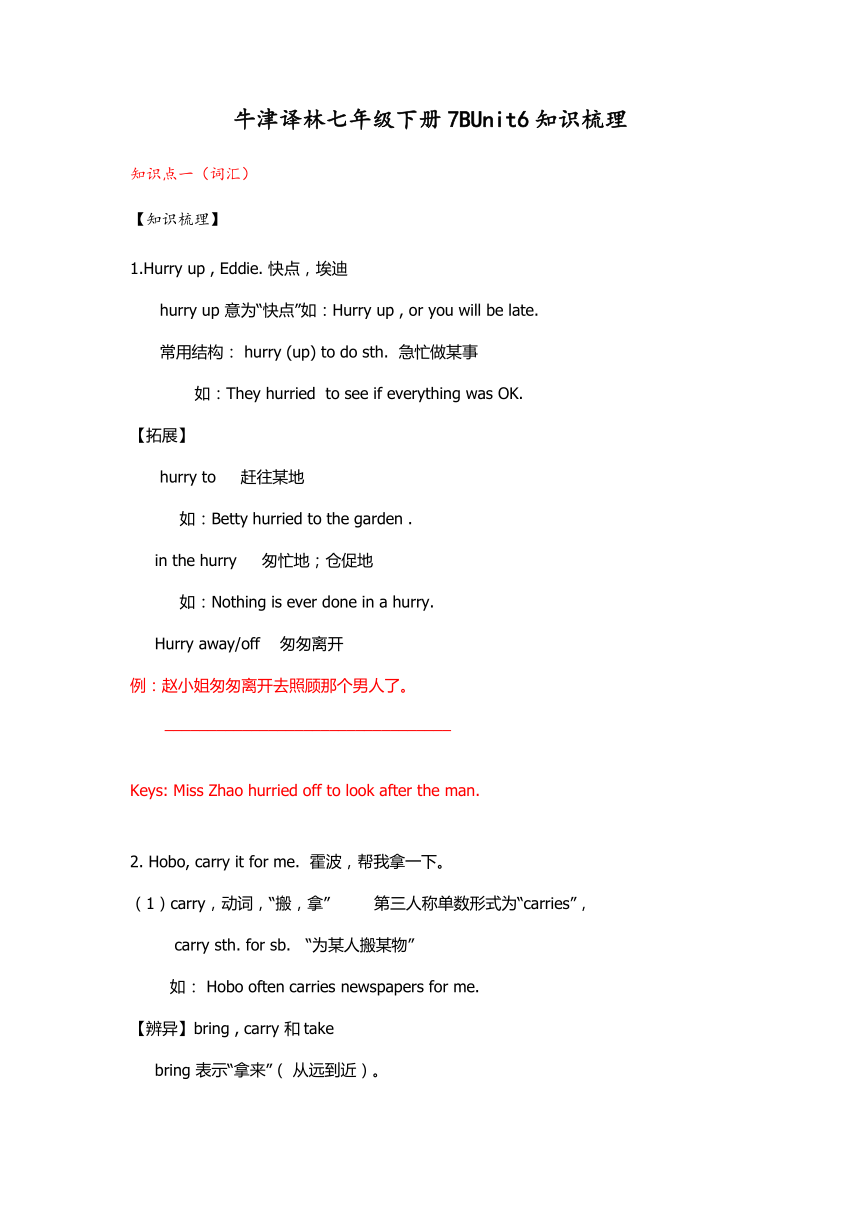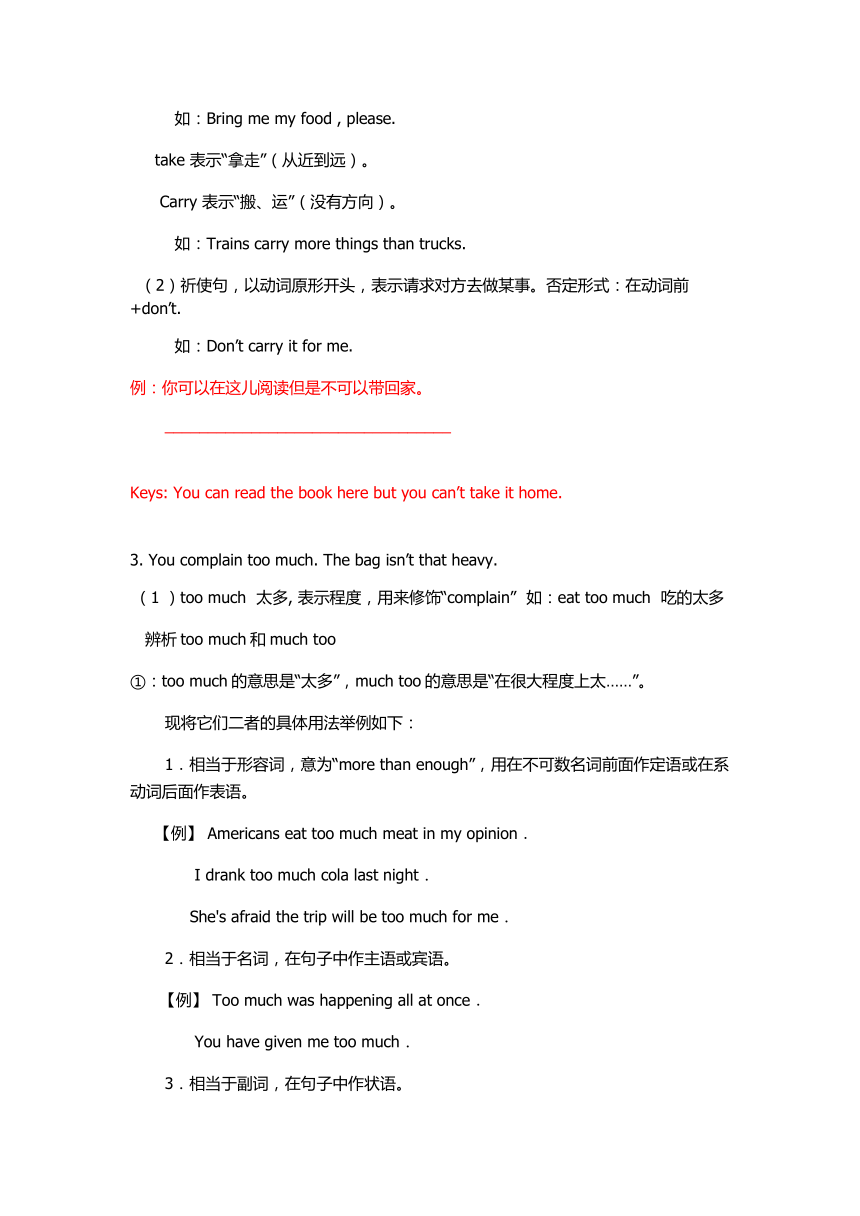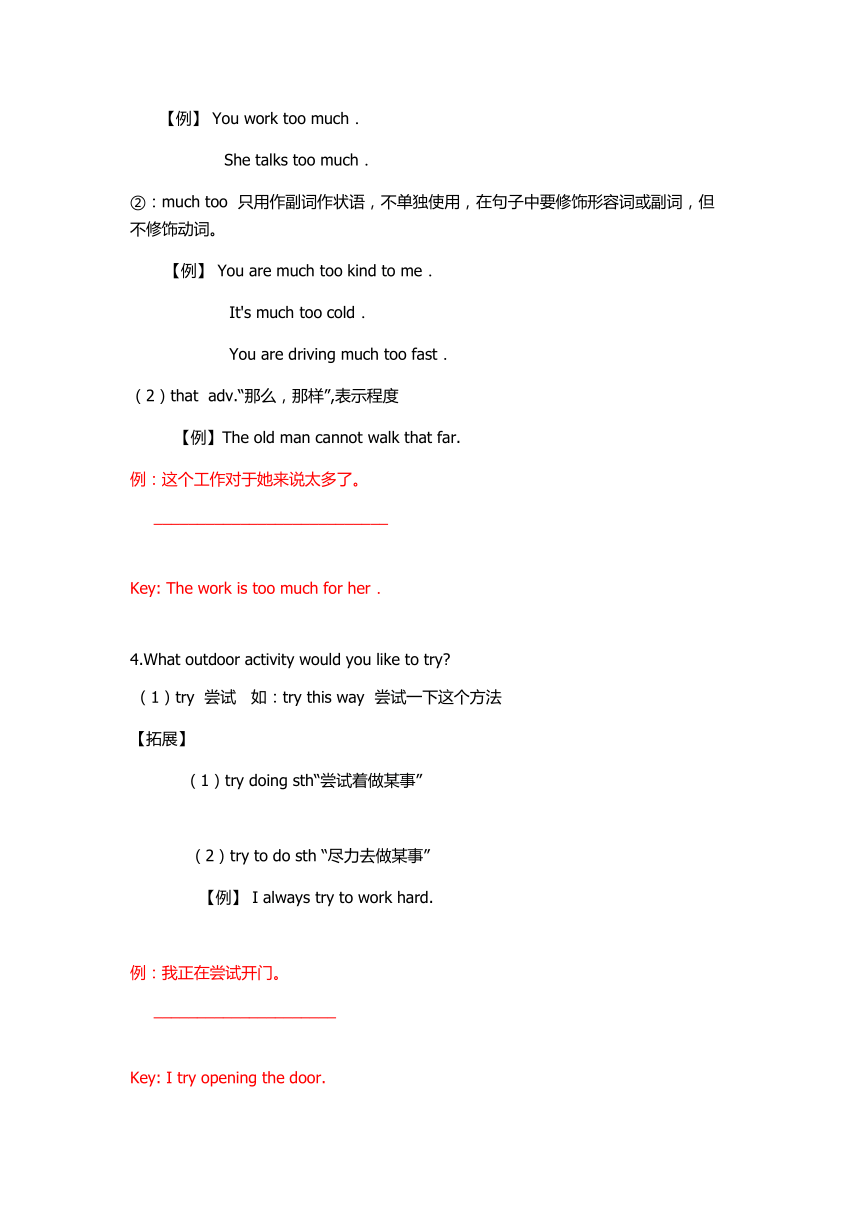Unit 6 Outdoor fun知识梳理学案(含学案)
文档属性
| 名称 | Unit 6 Outdoor fun知识梳理学案(含学案) |

|
|
| 格式 | zip | ||
| 文件大小 | 30.5KB | ||
| 资源类型 | 教案 | ||
| 版本资源 | 牛津译林版 | ||
| 科目 | 英语 | ||
| 更新时间 | 2020-03-07 11:49:08 | ||
图片预览



文档简介
牛津译林七年级下册7BUnit6知识梳理
知识点一(词汇)
【知识梳理】
1.Hurry up , Eddie. 快点,埃迪
hurry up 意为“快点”如:Hurry up , or you will be late.
常用结构: hurry (up) to do sth. 急忙做某事
如:They hurried to see if everything was OK.
【拓展】
hurry to 赶往某地
如:Betty hurried to the garden .
in the hurry 匆忙地;仓促地
如:Nothing is ever done in a hurry.
Hurry away/off 匆匆离开
例:赵小姐匆匆离开去照顾那个男人了。
_________________________________
Keys: Miss Zhao hurried off to look after the man.
2. Hobo, carry it for me. 霍波,帮我拿一下。
(1)carry,动词,“搬,拿” 第三人称单数形式为“carries”,
carry sth. for sb. “为某人搬某物”
如: Hobo often carries newspapers for me.
【辨异】bring , carry 和take
bring 表示“拿来”( 从远到近)。
如:Bring me my food , please.
take 表示“拿走”(从近到远)。
Carry 表示“搬、运”(没有方向)。
如:Trains carry more things than trucks.
(2)祈使句,以动词原形开头,表示请求对方去做某事。否定形式:在动词前+don’t.
如:Don’t carry it for me.
例:你可以在这儿阅读但是不可以带回家。
_________________________________
Keys: You can read the book here but you can’t take it home.
3. You complain too much. The bag isn’t that heavy.
(1 )too much 太多, 表示程度,用来修饰“complain” 如:eat too much 吃的太多
辨析too much和much too
①:too much的意思是“太多”,much too的意思是“在很大程度上太……”。
现将它们二者的具体用法举例如下:
1.相当于形容词,意为“more than enough”,用在不可数名词前面作定语或在系动词后面作表语。
【例】 Americans eat too much meat in my opinion.
I drank too much cola last night.
She's afraid the trip will be too much for me.
2.相当于名词,在句子中作主语或宾语。
【例】 Too much was happening all at once.
You have given me too much.
3.相当于副词,在句子中作状语。
【例】 You work too much.
She talks too much.
②:much too 只用作副词作状语,不单独使用,在句子中要修饰形容词或副词,但不修饰动词。
【例】 You are much too kind to me.
It's much too cold.
You are driving much too fast.
(2)that adv.“那么,那样”,表示程度
【例】The old man cannot walk that far.
例:这个工作对于她来说太多了。
___________________________
Key: The work is too much for her.
4.What outdoor activity would you like to try?
(1)try 尝试 如:try this way 尝试一下这个方法
【拓展】
(1)try doing sth“尝试着做某事”
(2)try to do sth “尽力去做某事”
【例】 I always try to work hard.
例:我正在尝试开门。
_____________________
Key: I try opening the door.
5.She looked up and saw a white rabbit in the coat passing by.
(1)see sb. doing sth. 看见某人正在做某事
如:I saw an old man crossing the street.
see sb. do sth. 经常看见某人做某事/看见某人某个动作的全过程。
如:I often see him read on the playground.
(2)pass,动词,意为“经过”,后接名词或代词做宾语;当没有宾语时常用pass by 表示“经过”。
如:I passed the shop on my way to the school.
【拓展】
①通过,度过,v
In the end , I passed the English exam.
②传,递,v pass sb. sth.=pass sth. to sb.
Pass me some bread , please.
(3)by , adv,经过,常与动词go , walk , run 等连用。
I saw Tom walking by , carrying two books.
【拓展】
by , prep , 靠近;在......的旁边;通过
例:湖旁边的房子是一个餐厅。
_______________________________
你经常骑自行车去学校吗?
_____________________________
Keys: The house by the lake is a restaurant.
Do you often go to school by bike .
6.(1)fall , 落下,掉落;倒下,v 过去式:fell
Jack fell into the water and got wet.
【拓展】
fall down 掉下,摔下 fall off 掉下 跌落 fall behind 落后,跟不上
fall over 跌倒 fall into 掉到......里
(2)hit 到达;击中,撞 ;v 后面直接跟人或物做宾语
Look out ! Don’t hit the tree. 当心!不要撞在树上。
常用结构:hit sb. in/on the +身体部位
例:她打了她的脸/头。
_____________________
Key: She hit him in the face/on the head.
7.She found herself alone in a long , low hall.
(1)find+宾语+形容词 意为“发现某人/某物处于某种(意外的)状态”
I found myself excited when I watched the football match.
【拓展】类似结构:keep/make...+宾语+形容词。
We must keep our classroom clean.
His words made us happy .
(2)alone ①adj. 单独的
Robinson was alone on the island.
②adv.单独地,独自 等同于“on one’s own”和“by oneself”
例:这个老妇人独自住在山村里。
____________________________
Key: The old woman lived alone in the mountain village.
8.Then Alice noticed a small door and put the key into it.然后爱丽丝注意到一个小门并把钥匙放进去。
notice sb. do sth. 注意到某人做某事,强调注意到动作的全过程或动作经常发生
notice sb. doing sth. 注意到某人正在做某事,强调注意到动作正在进行
例:He notice a bird in the tree.他注意到一直鸟正在树上唱歌。
I noticed him enter the office. 我注意到他进了办公室。
Keys: singing/entering
知识点二 一般过去时
【知识梳理】
1.一般过去时的构成
一般过去时用动词的过去式表示。
2.一般过去时的用法
(1)表示过去某时间发生的动作或存在的状态。
【例】We visited a farm last Sunday . 我们上周日参观了一个农场。
(2)表示过去的习惯或经常发生的动作。(过去常常做某事也可用used to do sth. 来表示)
【例】When I was in the countryside , I used to swim in the river .在农村,我常常在河里游泳。
(3)与一般过去时连用的时间状语有:last night , yesterday , last week , some years ago , in 1990 ,in the past , the other day ,at that time , just now 等。
3. 一般过去时的肯定、否定和疑问句式
⑴?肯定句“主语+动词过去式+其他”。
【例】?I?played?tennis?last?weekend.???我上周末打网球了。?
My?school?trip?was?great.????我的学校郊游棒极了。?
⑵?否定句“主语+didn’t+动词原形+其他”或“主语+wasn’t/weren’t+其他”。?
【例】?The?girl?didn’t?play?computer?games?yesterday?afternoon.? 这个女孩昨天下午没玩电子游戏。?
Old?Henry?wasn’t?happy?last?Friday.???上星期五老亨利不高兴。?
⑶?一般疑问句“Did+主语+动词原形+其他?””或者“Was/Were+主语+其他?”
肯定回答为“Yes,主语+did”, 肯定回答为“Yes,主语+was/were”,
否定回答为“No,主语+didn’t 否定回答为“No,主语+wasn’t/weren’t”。?
【例】—?Did?you?go?to?the?beach?????你们去海滩了吗??
—?Yes,?we?did./No,?we?didn’t.????是的,我们去了。/不,我们没有。?
—?Was?your?weekend?OK?????你的周末过得还行吧??
—?Yes,?it?was./No,?it?wasn’t.???是的,还行。/不,不行。?
⑷?特殊疑问句:特殊疑问词+一般疑问句(顺序)??
【例】—?What?did?Li?Lei?do?last?weekend????李雷上周末干什么了??
—?He?visited?his?grandparents.??????他去看了他的祖父母。?
—?Where?were?you?yesterday?????你昨天在哪儿?
—?I?was?at?home.????我在家里。?
4.动词过去式的变化规律
①一般在动词末尾加—ed。?【例】walk→walked????play→played?
②以不发音e结尾的动词末尾只加—d?。【例】love→loved??decide→decided?
③结尾是“辅音字母+y?”的动词。先将y?变为i,再加—ed?。?【例】study→studied???carry→carried?
④末尾只有一个辅音字母的重读闭音节,先双写该辅音字母,再加—ed?。? 【例】stop→stopped???plan→planned
⑤特殊情况见P106
